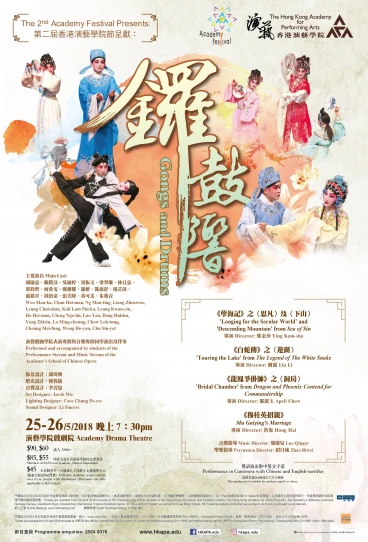
25 May (Fri) - 26 May (Sat)

Performance in Cantonese with Chinese and English surtitles
‘Longing for the Secular World’ and ‘Descending Mountain’ from Sea of Sin
Director: Ying Kam-sha
‘Touring the Lake’ from The Legend of The White Snake
Director: Liu Li
'Bridal Chamber' from Dragon and Phoenix Contend for Commandership
Director: April Chow
Mu Guiying's Marriage
Director: Hong Hai
Music Director: Luo Qinger
Percussion Director: Zhao Riwei
Performed and accompanied by the students of the Performance Stream and Music Stream of the Academy’s School of Chinese Opera
Main Cast:
Woo Man-ka
Chan Hoi-man
Ng Man-ting
Liang Zhenwen
Leung Chui-shan
Kali Lam Pui-ka
Leung Kwan-yin
Ho Hei-man
Cheng Nga-lui
Luo Yan
Deng Huishu
Yang Zhiyin
Lo Ming-cheung
Chow Lok-tung
Cheung Mei-fung
Wong Ho-yau
Chu Siu-yat
Set Designer: Jacob Wu
Lighting Designer: Coco Chung Po-yee
Sound Designer: Li Sincere
The May instalment of the School of Chinese Opera’s Gongs and Drums series consists of five excerpts of four distinctive Cantonese Opera styles. 'Bridal Chamber', from maestro Dr Lam Kar-sing’s famous Dragon and Phoenix Contend for Commandership, is known for its exciting scenes and rich, dynamic singing. The challenging ‘Longing for the Secular World’ and ‘Descending Mountain’ from Sea of Sin draws on Kunqu performing techniques, and uses props such as dusters and prayer beads to express the characters’ inner thoughts and feelings. In ‘Touring the Lake’ from The Legend of The White Snake, performers use body language to portray the love story of Xu Xian and Bai Suzhen. In the classical Mu Guiying's Marriage, the love-hate relationship between Mu Guiying and Yang Zongbao is depicted in the form of fight scenes and operatic singing, embodying the very unique feature of stylisation of Chinese Opera. The main purposes of performing repertoires of different styles are to broaden students’ exposure to more areas of performing arts and polish their integrated performing skills, eventually achieving the goal of “nurturing students’ development through opera”.